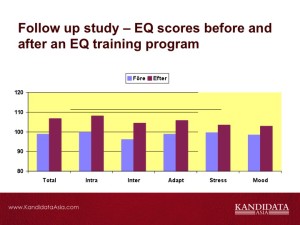In 2002 we ran one of our very first EQ training programs. It was a program for 33 construction managers coming from 13 different countries. In the construction business, just like in any business it is important to work in teams and to complete projects on time and to get along with colleagues and customers. The objective of the program was to strengthen the manager´s people skills and to encourage internal cooperation between subsidiaries in different countries.
The skepticism was certainly there but after each manager had done their EQi and received personal feedback they were positive and curious and became more and more engaged as the program progressed.
The 33 managers met during 3 days at 6 weeks intervals for 9 months. The program consisted of lectures and presentations, exercises and discussions based on the EQi model. There were exercises and discussions on each of the 15 competencies and each manager had a chance to practice the particular EQ skills that he (there were only men) saw as most important for improving his work performance. After the last session the 33 managers were tested with EQi again and we did follow-up interviews with the managers.
The graph represent the EQi before and after the training. A significant improvement on the 5 composite scales ( intrapersonal. interpersonal, adaptability, stress tolerance and general mood,) shown here and on the underlying 15 subscales.
When asked if and how they had been able to use the EQ training we received the following comments;
Managing change and coping with change.
“When moving to a new job (in a new country) I needed to…make people feel comfortable in telling me the truth. There were a lot of problems and improvement areas which needed to be identified. By using emotional intelligence, I think I got a good response and I could, therefore, take quick action in creating a new structure.”
Communication.
“My interpersonal interactions with customers, colleagues and subordinates have improved by being able to establish a deeper communication.”
Productivity.
“Proper listening and understanding have contributed to generating trust and therefore, more business opportunities.” And from someone else, “Recovering focus leads to accurate analysis and proper decisions which has a direct impact on the bottom line.”
Conflict resolution.
“Listening and understanding others’ problems and solving them so that both the individual and the company are winners, that is the most typical challenge in applying emotional intelligence.I feel that I have improved a lot”
Since 2002 we have run many, many EQ in Action programs for both tough and not so tough guys.

